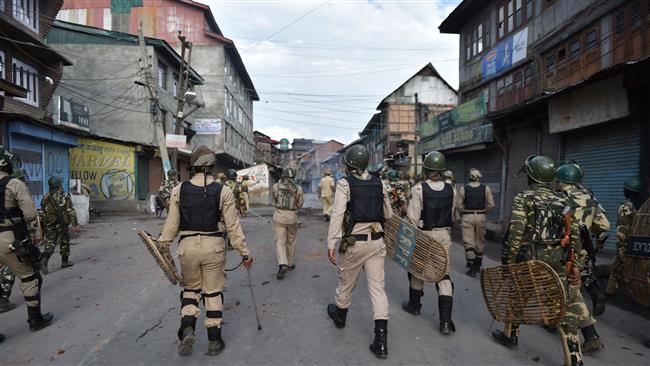
RNA - Addressing a ceremony to mark the 51st anniversary of Pakistan’s Defense Day in Tehran on Monday, Asif Ali Khan Durrani added that people in Kashmir have been bullied and coerced into submission as a result of the policy of state terrorism.
New methods of state terrorism can be seen in places where innocent people are losing their eyesight due to the use of pellet guns, he said.
Violence has re-emerged in Indian-controlled Kashmir on July 8, when people protested against the killing of Burhan Wani, a popular pro-independence fighter, by Indian forces. Over 70 people in Kashmir have been killed and thousands more injured.
A prolonged curfew, communication blackouts and a tightening crackdown have failed to stop some of the largest protests against the Indian rule across the region in recent years. There are an estimated 500,000 Indian troops currently deployed in the restive territory.
India and Pakistan have claimed Kashmir in full since they won independence from the British rule in 1947, but they only have partial control over it. Thousands of people have been killed in the unrest in Kashmir since early 1990s.
Elsewhere, Durrani noted that Pakistan's large-scale counter-terror Operation Zarb-e-Azb on the border with Afghanistan has recently managed to make great achievements in the eradication of terrorism and extremism.
He emphasized that the Pakistani Armed Forces and nation have paid a heavy price for the maintenance of the country’s territorial integrity and national sovereignty.
The envoy noted that the Pakistani Army's campaign against terrorism entered an important phase in the North Waziristan region in June 2014 with the launch of Zarb-e-Azb, adding that the operation shows Pakistan’s clear policy on cracking down on terrorism which has so far had favorable outcomes.
Such an achievement can have positive results not only for Pakistan but for the international community at large, particularly neighboring countries, Durrani said.
Operation Zarb-e-Azb was a joint military offensive conducted by the Pakistan Armed Forces against various militant groups. It was launched in June 2014 in North Waziristan along the Pakistan-Afghanistan border as a renewed effort against militancy.
In the country’s troubled northwestern tribal regions, Islamabad has been engaged in a major offensive against militant hideouts since June 2014, when a deadly raid on the Karachi International Airport ended the government’s faltering peace talks with the pro-Taliban militants.
Pakistan’s army has intensified military operations against the militants since pro-Taliban elements killed over 150 people, most of them children, in an armed assault on a school in the northwestern city of Peshawar in December 2014.
The ambassador further said that Pakistani Armed Forces have so far succeeded in conducting 41 peace missions in 23 countries from Africa to Southeast Asia, the Balkans and Central America.
111/847/C